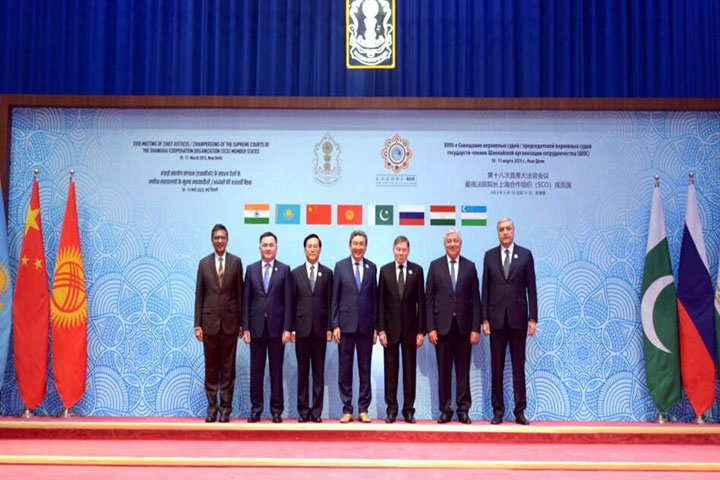International
'SCO countries should collectively strive to make judiciary more accessible'
Monday, 13 March 2023 , 03:28 PM

Chief Justice of India D Y Chandrachud has called on the Shanghai Cooperation Organisation (SCO) member states to strive for judicial cooperation in order to make the judicial system more approachable for the common people.
Addressing the conclusion of the 18th meeting of the Chief Justices/Chairpersons of the Supreme Courts of the member states here on Saturday, the CJI stressed “the need to collectively adopt new mechanisms to make court processes simpler and accessible”.
He highlighted several challenges facing the judicial systems in SCO member states and how the conference “allowed all member and observer states to reflect upon the challenges that are common to their jurisdictions”. CJI Chandrachud “emphasised that these issues need to be tackled with mutual cooperation and by sharing experiences and wisdom gathered”.
Except Pakistan, representatives of all other SCO member states, two observer states — Islamic Republic of Iran and Republic of Belarus — the SCO Regional Anti-Terrorism Structure (RATS) and SCO Secretariat were present at the two-day event. Pakistan joined through videoconferencing.
An official note said on day 1 of the conference, which started on March 10, a Joint Interaction Session was held wherein the participants discussed the challenges faced and measures taken during Covid-19 pandemic.
Day 2 of the event saw discussions on “smart courts” and the future of the judiciary. CJI Chandrachud said technology must be used to bridge the gap between citizens and the justice system and shared the recent endeavors made by the Supreme Court of India such as the launching e-version of Supreme Court reports, artificial intelligence-based live transcription of court proceedings and translation of judgments in multiple regional languages among others.\
Besides CJI Chandrachud, other speakers at the event included Aslambek Mergaliyev, Chairman of the Supreme Court of the Republic of Kazakhstan, Jinghong Gao, Vice-President of Supreme People’s Court of the People’s Republic of China, Zamirbek Bazarbekov, Chairman of the Supreme Court of the Kyrgyz Republic, Umar Ata Bandial, Chief Justice, Pakistan, Vyacheslav M. Lebedev, Chief Justice of the Supreme Court of the Russian Federation, Valery Kalinkovich, First Deputy Chairman of the Supreme Court of the Republic of Belarus, Mohammad Mosaddegh Kahnamoee, First Deputy of the Head of the Judiciary of the Islamic Republic of Iran, Janesh Kain, Deputy Secretary General, SCO Secretariat and Rakesh Kumar Verma, Deputy Director, Executive Committee, RATS, SCO.
Nail Akhmetzakirov, head of the Court Administration of the Republic of Kazakhstan, said their country has developed a new software post Covid-19 to make the electronic system in judicial services more accessible.
Speaking on the topic — ‘Facilitating “Access to Justice” (Justice should not be limited to privileged): issues, initiative, and prospects — Justice S K Kaul “raised concern regarding overly populated prisons and emphasised that the “issue of access to quality legal representation is a key element in the criminal justice system”.
Xiaochen Qiann, the Chief Judge of case-filing division of the Supreme People’s Court of the People’s Republic of China, said: “It was of prime importance for the growth of the judiciary that modern public judicial services were built, featuring inclusiveness, equity, convenience, efficiency, intelligence and accuracy.” He stressed that court work overload and limited judicial resources is a global challenge, which needs to be addressed both nationally and collectively as members of SCO.
The Chief Justice of the Supreme Court of the Russian Federation, Vyacheslav M Lebedev, highlighted that several laws have been created to protect the citizens, including the system of claims, which can be filed by the plaintiffs at their place of residence, allowing remote participation in court sessions, notifications via SMS regarding time and place of trial and availability of information regarding the working of the court”.
Speaking on ‘Institutional Challenges facing Judiciary: Delays, Infrastructure, Representation, and Transparency’, Justice K M Joseph highlighted the issue of high pendency of cases and the need for adequate infrastructure facilities as a means to access to justice”.
The official note said that the member states, while agreeing on a number of shared goals for the future of their judiciary, collectively entrusted the presidency for the next meeting of Chief Justices/Chairmans to Uzbekistan on rotation for the year 2024.
Source: The indian Express
